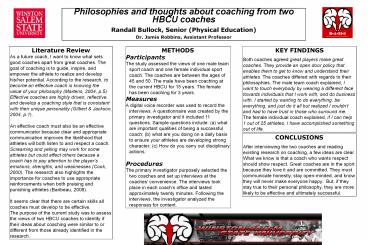Philosophies and thoughts about coaching from two HBCU coaches
1 / 1
Title:
Philosophies and thoughts about coaching from two HBCU coaches
Description:
An effective coach must also be an effective communicator because clear and ... The male team coach explained, I want to touch everybody by wearing a different ... –
Number of Views:74
Avg rating:3.0/5.0
Title: Philosophies and thoughts about coaching from two HBCU coaches
1
Philosophies and thoughts about coaching from two
HBCU coaches Randall Bullock, Senior (Physical
Education) Dr. Jamie Robbins, Assistant Professor
Literature Review As a future coach, I want to
know what sets good coaches apart from great
coaches. The goal of coaching is to guide,
inspire, and empower the athlete to realize and
develop his/her potential. According to the
research, to become an effective coach is knowing
the value of your philosophy (Martens, 2004,
p.5). Effective coaches are highly driven,
reflective, and develop a coaching style that is
consistent with their unique personality (Gilbert
Jackson, 2004, p.1). An effective coach must
also be an effective communicator because clear
and appropriate communication improves the
likelihood that athletes will both listen to and
respect a coach. Screaming and yelling may work
for some athletes but could affect others because
a coach has to pay attention to the players
emotions, strengths, and weaknesses (Cook, 2000).
The research also highlights the importance for
coaches to use appropriate reinforcements when
both praising and punishing athletes (Baribeau,
2008). It seems clear that there are certain
skills all coaches must develop to be effective.
The purpose of the current study was to assess
the views of two HBCU coaches to identify if
their ideas about coaching were similar to or
different from those already identified in the
research.
METHODS Participants The study assessed the views
of one male team sport coach and one female
individual sport coach. The coaches are between
the ages of 45 and 50. The male have been
coaching at the current HBCU for 15 years. The
female has been coaching for 3 years. Measures A
digital voice recorder was used to record the
interviews. A questionnaire was created by the
primary investigator and it included 11
questions. Sample questions include (a) what are
important qualities of being a successful coach
(b) what are you doing on a daily basis to ensure
your athletes are developing strong character
(c) How do you carry out disciplinary
actions. Procedures The primary investigator
purposely selected the two coaches and set up
interviews at the coaches convenience. The
interviews took place in each coachs office and
lasted approximately twenty minutes. Following
the interviews, the investigator analyzed the
responses for content.
KEY FINDINGS Both coaches agreed great players
make great coaches. They provide an open door
policy that enables them to get to know and
understand their athletes. The coaches differed
with regards to their philosophies. The male team
coach explained, I want to touch everybody by
wearing a different face towards individuals that
I work with, and do business with. I started by
wanting to do everything, be everything, and just
do it all but realized I couldnt and had to have
trust in those who surround me. The female
individual coach explained, if I can help 1 out
of 25 athletes, I have accomplished something out
of life.
CONCLUSIONS After interviewing the two coaches
and reading existing research on coaching, a few
ideas are clear. What we know is that a coach who
wants respect should show respect. Great coaches
are in the sport because they love it and are
committed. They must communicate honestly, stay
open-minded, and know they will never make
everyone happy. But, if they stay true to their
personal philosophy, they are more likely to be
effective and ultimately successful.































